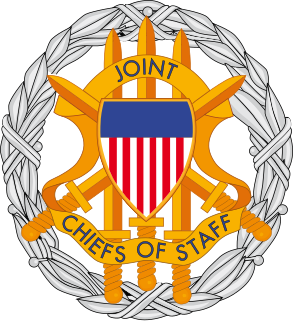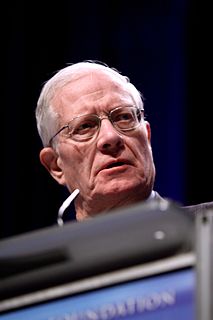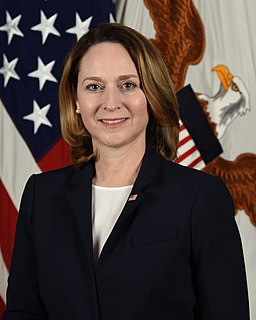Related Research Articles
The National Security Strategy (NSS) is a document prepared periodically by the executive branch of the United States that lists the national security concerns and how the administration plans to deal with them. The legal foundation for the document is spelled out in the Goldwater–Nichols Act. The document is purposely general in content, and its implementation relies on elaborating guidance provided in supporting documents such as the National Military Strategy.

The Joint Chiefs of Staff (JCS) is the body of the most senior uniformed leaders within the United States Department of Defense, that advises the president of the United States, the secretary of defense, the Homeland Security Council and the National Security Council on military matters. The composition of the Joint Chiefs of Staff is defined by statute and consists of a chairman (CJCS), a vice chairman (VJCS), the service chiefs of the Army, Marine Corps, Navy, Air Force, Space Force, and the chief of the National Guard Bureau. Each of the individual service chiefs, outside their JCS obligations, work directly under the secretaries of their respective military departments, e.g. the secretary of the Army, the secretary of the Navy, and the secretary of the Air Force.

The Center for Strategic and International Studies (CSIS) is a think tank based in Washington, D.C., in the United States. CSIS was founded as the Center for Strategic and International Studies of Georgetown University in 1962. The center conducts policy studies and strategic analyses of political, economic and security issues throughout the world, with a specific focus on issues concerning international relations, trade, technology, finance, energy and geostrategy.

The Goldwater–Nichols Department of Defense Reorganization Act of October 4, 1986Pub.L. 99–433,, made the most sweeping changes to the United States Department of Defense since the department was established in the National Security Act of 1947 by reworking the command structure of the United States military. It increased the powers of the chairman of the Joint Chiefs of Staff and implemented some of the suggestions from the Packard Commission, commissioned by President Reagan in 1985. Among other changes, Goldwater–Nichols streamlined the military chain of command, which now runs from the president through the secretary of defense directly to combatant commanders, bypassing the service chiefs. The service chiefs were assigned to an advisory role to the president and the secretary of defense and given the responsibility for training and equipping personnel for the unified combatant commands.

Robert Charlwood Richardson III was an American military officer of the United States Army Air Corps, and subsequently the United States Air Force, eventually attaining the rank of brigadier general. A leader in the early days of the US Air Force, he was a renowned expert in tactical nuclear warfare, NATO, and military long range planning.

Ashton Baldwin Carter is an American public policy professor who served as the 25th secretary of defense from February 2015 to January 2017. He is currently director of the Belfer Center for Science & International Affairs at Harvard Kennedy School.

United States Strategic Command (USSTRATCOM) is one of the eleven unified combatant commands in the United States Department of Defense. Headquartered at Offutt Air Force Base, Nebraska, USSTRATCOM is responsible for strategic deterrence, global strike, and operating the Defense Department's Global Information Grid. It also provides a host of capabilities to support the other combatant commands, including integrated missile defense; and global command, control, communications, computers, intelligence, surveillance, and reconnaissance (C4ISR). This command exists to give national leadership a unified resource for greater understanding of specific threats around the world and the means to respond to those threats rapidly.

The Air Staff is one of the Department of the Air Force's two statutorily designated headquarters staffs: the other staff is the Office of the Secretary of the Air Force, also known as the Secretariat. The Air Staff is headed by the Chief of Staff of the Air Force. The Air Staff is primarily composed of uniformed U.S. Air Force officials who assist the Chief of Staff in carrying out his dual-hatted role: as the principal military advisor to the Secretary of the Air Force, and as a member of the Joint Chiefs of Staff.
The National Military Strategy (NMS) is issued by the Chairman of the Joint Chiefs of Staff as a deliverable to the Secretary of Defense briefly outlining the strategic aims of the armed services. The NMS's chief source of guidance is the National Security Strategy document.

A unified combatant command (CCMD), also referred to as a combatant command, is a joint military command of the United States Department of Defense that is composed of units from two or more service branches of the United States Armed Forces, and conducts broad and continuing missions. There are currently 11 unified combatant commands and each are established as the highest echelons of military commands, in order to provide effective command and control of all U.S. military forces, regardless of branch of service, during peace or during war time. Unified combatant commands are organized either on a geographical basis or on a functional basis, e.g. special operations, force projection, transport, and cybersecurity. Currently, seven combatant commands are designated as geographical, and four are designated as functional. Unified combatant commands are "joint" commands and have specific badges denoting their affiliation.

The United States under secretary of defense for policy (USDP) is a high level civilian official in the United States Department of Defense. The under secretary of defense for policy is the principal staff assistant and adviser to both the secretary of defense and the deputy secretary of defense for all matters concerning the formation of national security and defense policy.

The National Command Authority,, is the apex civilian-led command to oversee the employment, policy formulation, exercises, deployment, research and development, and operational command and control of Pakistan's nuclear arsenals.

Anthony H. Cordesman holds the Arleigh A. Burke Chair in Strategy at the Center for Strategic and International Studies (CSIS) and is a national security analyst on a number of global conflicts.

The United States Department of Defense is an executive branch department of the federal government charged with coordinating and supervising all agencies and functions of the government directly related to national security and the United States Armed Forces. The DOD is the largest employer in the world, with over 1.4 million active-duty service members as of 2021. More employees include over 826,000 National Guard and reservists from the armed forces, and over 732,000 civilians bringing the total to over 2.8 million employees. Headquartered at the Pentagon in Arlington, Virginia, just outside Washington, D.C., the DoD's stated mission is to provide "the military forces needed to deter war and ensure our nation's security".

John Alexander Gordon was an American air force general who served as Deputy Director of the Central Intelligence Agency. He also served as the President's Homeland Security advisor from 2003 to 2004.
The Center for Strategic and Budgetary Assessments (CSBA) is an independent, non-profit, Washington, D.C.-based think tank specializing in US defense policy, force planning, and budgets. It is headed by Thomas Mahnken. According to its website, CSBA's mission is "to promote innovative thinking and debate about national security strategy, defense planning and military investment options ... [and] to enable policymakers to make informed decisions in matters of strategy, security policy and resource allocation."
Bruce Gentry Blair was a nuclear security expert and a research scholar, a national security expert, the author of articles and books on nuclear topics, and a television show producer.
The Fletcher School's International Security Studies Program is a center for the study of international security studies and security policy development. It was established in 1971 at The Fletcher School of Law and Diplomacy, Tufts University. ISSP conducts its academic activity through courses, simulations, conferences, and research. It also has a military fellows program for midcareer U.S. officers.

Leo W. Smith II is a retired American Air Force lieutenant general whose last assignment was vice commander in chief, Strategic Air Command, headquartered at Offutt Air Force Base, Nebraska. He assumed this position June 1, 1991 and served until June 1, 1992.

Kathleen Holland Hicks is an American government official who has served as the United States deputy secretary of defense since February 9, 2021, where she will lead the modernization of the country's nuclear triad. Hicks is the first Senate-confirmed woman in this role. In 2012, Hicks was the principal deputy under secretary of defense for policy during the Obama administration. By 2020 Hicks was an American academic and national security advisor working as a senior vice president and director of the international security program at the Center for Strategic and International Studies. She is the highest ranking woman currently serving in the United States Department of Defense.